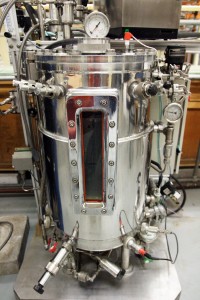The Department of Chemical Engineering & Applied Chemistry is expanding its undergraduate teaching facilities and incorporating new, state-of-the-art Integrated Chemical Engineering (ICE) experiments that will help ensure the relevance and excellence of the education we offer.
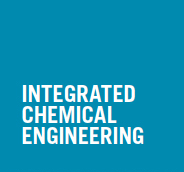
Integration will take place on two levels: First, students will perform experiments that consist of several integrated unit operations and allow them to take raw materials through to a final product. Second, students will integrate the theoretical principles they are learning in their course work through experimentation and computer-based simulation.
New experiments were introduced starting in 2013 and the expectation is that new ICE experiments will be rolled out over the next several years as we raise funds and attract industrial partners.
Learn how you or your company can get involved.
The ICE Laboratory will include:
VERSATILE BATCH SYSTEM ZONE
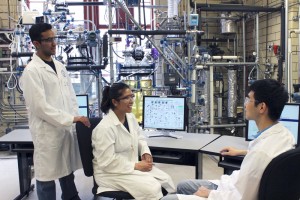 A new facility consisting of 5L, 50L and 100L batch reactors instrumented with state-of-the-art equipment was introduced for the first time in 2014. Students carry out the synthesis of octyl acetate over a three-day lab. On the first day, the synthesis reaction of octanol and acetic acid using a sulphuric acid catalyst is run in the 50L reactor. Separation of the organic and aqueous phases is performed on the second day in the 100L reactor. Purification of the desired product in the organic phase is attempted on the third day in the 5L reactor using batch distillation. Click the photo for a larger view.
A new facility consisting of 5L, 50L and 100L batch reactors instrumented with state-of-the-art equipment was introduced for the first time in 2014. Students carry out the synthesis of octyl acetate over a three-day lab. On the first day, the synthesis reaction of octanol and acetic acid using a sulphuric acid catalyst is run in the 50L reactor. Separation of the organic and aqueous phases is performed on the second day in the 100L reactor. Purification of the desired product in the organic phase is attempted on the third day in the 5L reactor using batch distillation. Click the photo for a larger view.
BIOENGINEERING ZONE
Bioengineering and bioprocessing are key components of the emerging bio-economy, in which renewable materials form the basis of sustainable production processes. Biologically mediated processes are used in the pharmaceuticals, biofuels and bioproducts sectors, which will become an ever-greater part of manufacturing in the coming decades.
In the new Bioengineering Zone of the Unit Ops Lab students will gain an understanding of the challenges of working with living organisms in an industrial setting Undergraduate students performed experiments in the pictured fermenter for the first time in 2013 in the fourth year Bioprocess Engineering course.
WATER TREATMENT ZONE
This new zone of the Unit Ops Lab will incorporate advanced processes in areas such as membranes for nano, ultra and micro filtration, adsorption, UV disinfection, ion exchange and filtration. The treatment of drinking water and wastewater is a significant global issue. As we learn more about the impact of contaminants on human health, the need for effective and economical treatment continues to grow.
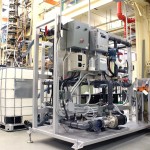 With this in mind, a pilot scale water flow loop system has been designed and is being constructed in the Unit Operations Laboratory. The Flow Loop is modular so that different technologies can be tested, including disinfection technologies such as ultraviolet and chemical, filtration technologies such as filters and membranes, and other technologies such as dissolved air flotation. The system is fully automated so that short and long-term testing can be performed.
With this in mind, a pilot scale water flow loop system has been designed and is being constructed in the Unit Operations Laboratory. The Flow Loop is modular so that different technologies can be tested, including disinfection technologies such as ultraviolet and chemical, filtration technologies such as filters and membranes, and other technologies such as dissolved air flotation. The system is fully automated so that short and long-term testing can be performed.
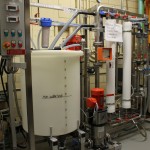 The reverse osmosis system pictured here was introduced in 2014 to teach students how to use a membrane separation technique, how to characterize the osmosis membrane and how to study the essential parameters of the process: flows, membrane pressure, quality of permeate. Students study both municipal water and saline solutions and become familiar with the key operating conditions required to optimize the osmosis process.
The reverse osmosis system pictured here was introduced in 2014 to teach students how to use a membrane separation technique, how to characterize the osmosis membrane and how to study the essential parameters of the process: flows, membrane pressure, quality of permeate. Students study both municipal water and saline solutions and become familiar with the key operating conditions required to optimize the osmosis process.
FLUID FLOW AND HEAT TRANSFER ZONE
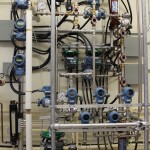 Several experiments allow students to study concepts in fluid mechanics and heat transfer, giving them a hands-on appreciation for how chemical engineering processes are coupled and connected from an energy and mass flow point of view. New test racks are envisaged for this zone of the Unit Ops Lab to give students exposure to how fluid flow, temperature and pressure are measured for monitoring and control purposes.
Several experiments allow students to study concepts in fluid mechanics and heat transfer, giving them a hands-on appreciation for how chemical engineering processes are coupled and connected from an energy and mass flow point of view. New test racks are envisaged for this zone of the Unit Ops Lab to give students exposure to how fluid flow, temperature and pressure are measured for monitoring and control purposes.
To learn more about the ICE Laboratory and / or to get involved, contact:
Professor Ramin Farnood
Chair, Department of Chemical Engineering & Applied Chemistry
416-946-7525 | ramin.farnood@utoronto.ca
